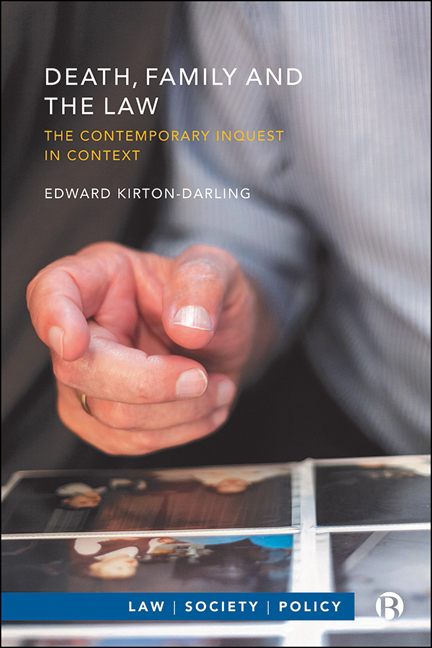Book contents
- Frontmatter
- Contents
- Acknowledgements
- Series Editor’s Preface
- 1 Death, Family and the Law
- 2 Accountability and Authority in the Historical Jurisdiction
- 3 Accountability Reconceived
- 4 First Contact and the Next of Kin
- 5 Dignity, the Family and the Body
- 6 Family in the Driving Seat
- 7 The Public(?) Hearing
- 8 Reimagining the Inquest
- Bibliography
- Index
1 - Death, Family and the Law
Published online by Cambridge University Press: 08 October 2022
- Frontmatter
- Contents
- Acknowledgements
- Series Editor’s Preface
- 1 Death, Family and the Law
- 2 Accountability and Authority in the Historical Jurisdiction
- 3 Accountability Reconceived
- 4 First Contact and the Next of Kin
- 5 Dignity, the Family and the Body
- 6 Family in the Driving Seat
- 7 The Public(?) Hearing
- 8 Reimagining the Inquest
- Bibliography
- Index
Summary
Introduction
The inquest is characterized by paradox: a legal forum which is simultaneously high profile and unfamiliar, extraordinary and routine. It is a jurisdiction which often appears anachronistic and peripheral to other systems of justice and governance. At the same time, the human stories which the inquest hearing tells, of accident and violence, individual mistake and structural misdeed, fascinate the media, leading bulletins, filling front pages and provoking heated public debate. It is a court hearing but not a trial, presented as a non-adversarial inquiry into facts, in which the bereaved family are at the centre (Thornton 2012a). However, it is also a setting experienced by many as a combative, contested space, obscurely governed by technical legal provisions.
Cultural and anthropological scholarship would suggest these contradictions emerge from our paradoxical relationships with death itself; irresistible and abhorrent, we look at and look away from death, we silence pain and need to hear it. As with the death it is responsible for explaining, the inquest similarly compels and repels, while the grief of those who remain can provoke complex and conflicting public responses.
This all means that inquests are engaging, but this engagement itself is inherently problematic. Sudden unexpected death is dramatic, containing the potential to grab attention and reveal deeper common truths. It also carries risks associated with exploitation and well-meaning but damaging interventions on behalf of those bereaved by death. This includes emphasis on the therapeutic possibilities in a process ‘framed as a precondition to achieving closure’ (Fincham et al 2011, 65), positing grief as a psychological process to work through. It is a perspective characterized by Butler as invoking ‘the Protestant ethic when it comes to loss’ (Butler 2006, 21), which approaches bereavement as an injury to be healed rather than as a feature of precariously held life.
It is a system which scholarship has represented as attempting to give death ‘a more predictable veneer’ (Howarth 2007, 160), transforming death into an inescapable incident, meaning it ‘becomes possible to repair and reaffirm culturally dominant assumptions about the “facts of life” ‘ (Langer 2010, 86). Troublingly, however, this framing can hide the ways in which structures of injustice are frequently implicated in death (Razack 2011b and 2015), and is therefore an approach, emphasizing inevitability and tragedy, which risks amplifying that injustice.
- Type
- Chapter
- Information
- Death, Family and the LawThe Contemporary Inquest in Context, pp. 1 - 24Publisher: Bristol University PressPrint publication year: 2022



